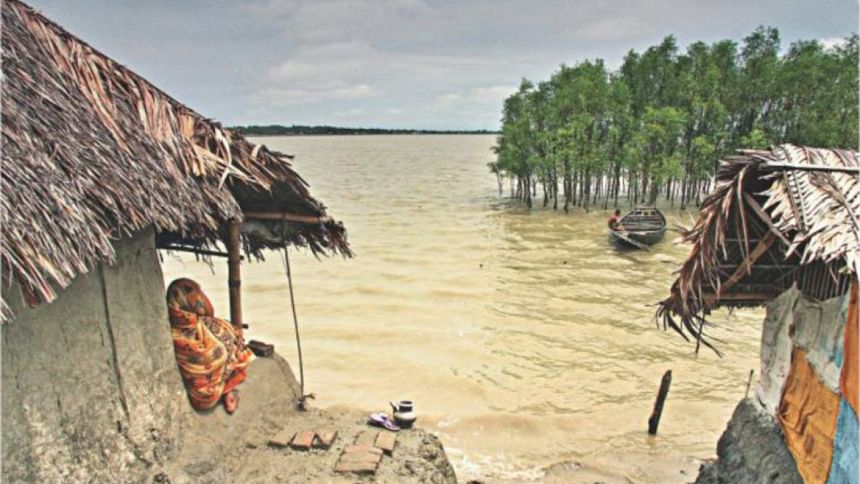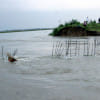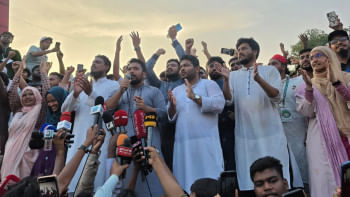COP25: The case for a sincere investment in loss and damage

On the shores of the Bay of Bengal, skirting around the Sundarbans, in a remote village called Abadchondipur in Satkhira, lives Mashkura, aged 28, the wife of a shrimp farmer. Her childhood was a happy one; she had rice to eat, fields to play in and a heart filled with hope that, in the coming years, she would be a wife and a mother.
Over the four years of her marriage, her dreams were slowly shattered, with not one but three miscarriages, and the beginning of social ostracism. Mashkura was a victim of exposure to excess salinity.
As sea levels rise and the coast is hit by increasingly erratic storms and tidal surges, the salinity levels of the open sea spread north into non-coastal areas, impacting the lives of millions like Mashkura. Her story is only one example of how Bangladesh pays dearly for the world's failure to take action against climate change. This unnecessary pain is unacceptable.
Even though developed countries are primarily responsible for climate change, the International Institute for Environment and Development found that the rural poor in Bangladesh were spending an average of USD 2 billion a year to address the impacts of climate change—more than the government and aid agencies' spending put together. International financing covers only 4 percent of spending on climate action in Bangladesh. Thus, struggling rural communities are left to bear most of the burden of climate change themselves.
World leaders agreed in 2015 at the 21st sitting of the Conference of Parties (COP21) on the importance of "averting, minimising and addressing loss and damage associated with the adverse effects of climate change," including slow-onset disasters like salination. Little has been achieved since then. The parties were caught in a tussle about how to define and measure the losses, while thousands like Mashkura continue to suffer.
Bangladesh is a low-lying delta crammed with 170 million people, battered frequently by fierce cyclones, and threatened with submersion in a matter of decades if the world keeps warming at its current rate. The Long-Term Climate Risk Index ranks Bangladesh 7th among the countries most affected by extreme weather events since 1998, and predicts that it will have 42 million people at risk by 2050. There are around 35 million people currently living along the coastal belt of the Bay of Bengal, on the edge of a climate catastrophe.
The immediate impacts of storms and tidal upsurges are well-known and often spoken about, but we hear less about the resulting salinity increases, and the dangers they bring. Each time a tidal surge sweeps inland, salty water from the sea contaminates farms and water sources. The effects are manifested in worsening crop yields, malnutrition and drastic economic effects. Diseases and miscarriages during pregnancy are major concerns. ICDDR,B monitored 12,867 pregnancies between 2012 and 2017 and found that women living within 20km of the coastline were far likelier to miscarry than women who lived further inland.
Other areas of Bangladesh are also battling climate change. The northeast faces floods every year, which are increasing both in duration and magnitude as the climate crisis intensifies. The hill tracts in the east face drastic landslides causing loss of lives and homes each year.
The riverine sedimentary deltas, or "chars" as they are locally known, are continually eroding, breaking up and disappearing in one place and forming in another. Millions of people live in these neglected places and their migratory communities. Many of them have had to relocate and start anew as many as 20-30 times in their lives. Each time, they lose nearly all of their assets, becoming poorer and poorer. The char communities have long been vulnerable to floods, droughts and erosion. But now the increasing unpredictability of these events has made life nearly unbearable.
The impermanence of the land makes it impossible to have electric or gas lines, roads or permanent buildings on the chars. Traditional infrastructure is impossible in these regions, and a service delivery mechanism suited to this unique landscape is yet to be put in place. As a result, in spite of goodwill from all sides, they are, in reality, totally cut off from basic services—be it healthcare, education, legal services, financial assistance, or often even disaster relief. The rivers at their broadest can be 25km in breadth and, whilst in spate, can flow between 10 to 12 knots! The little worn-out boats available in the areas are inadequate for service delivery, rendering the communities more vulnerable to the impacts of the changing climate.
It was in these areas that Friendship began its journey with a floating hospital in 2002. Since then, the organisation has expanded to include more floating and land hospitals, satellite clinics, "community medic-aides" and programmes for climate adaptation, economic development, education, inclusive citizenship and cultural preservation. We have developed a three-tier system structured around the floating or land hospitals, with satellite clinics and community medic-aides trained by Friendship and equipped with app-based mobile health services. This system allows Friendship to reach 6.5 million people from the most remote and unaddressed communities in the world.
And it is thus with the help of Friendship paramedic Sangita Boral that Mashkura has finally become a proud mother. The solution was simple: she switched to drinking water from a nearby desalination plant, which Friendship had installed a couple of years ago. But there are many more climate victims like Mashkura. They do not get any benefit from the progress of the 21st century, the growth of companies, innovations of our world, the onrush of the 4th Industrial Revolution. They only see their one life ebbing away in a state of bare survival.
The government of Bangladesh and non-governmental organisations have been working on disaster preparedness in the coastal belt, and there have been massive improvements in prediction, mitigation, preparation, protocols, procedures, lifestyles, architecture, infrastructure, etc. The death rates have drastically diminished in the last few decades; however, lives are still lost, along with harvests, livestock, homes and properties. Cyclones and floods still disrupt millions of lives. Only when you die and become a statistic, are your issues addressed somewhere in the world scene; but while suffering mentally or physically, you are not a statistic and thus you remain unaccounted for, unaddressed.
However, Bangladesh's vulnerability makes it an important player in the fight against climate change. The government and many non-government agencies, like Friendship, have worked for years to develop innovative solutions for the communities to cope with the climate change issues. Former UN Secretary-General Ban Ki-moon has called our prime minister "one of the few global leaders on climate change." He also said that Bangladesh was "the best teacher to learn from about adaptation." This is because we get to learn harsh lessons from the climate each day.
The entirety of Friendship's work is in climate-impacted areas, and all of our beneficiaries are people who are displaced or otherwise endangered by immediate climate impact. The work we do could help climate-impacted communities around the world. Bangladesh has learnt many lessons in climate change resilience. It is, however, impossible for us to make a difference in the world without a committed and sincere effort on the part of the international community.
This is why every nation, regardless of whether they are contributing to or impacted by climate change, needed to agree at COP25 to invest in averting, minimising and addressing loss and damage due to climate change. Instead, final decisions on rules for carbon markets and trading emissions credits have been again postponed to next year at COP26… whilst millions of lives are likely to fall apart during these 365 days of waiting.
Leaders have tended to treat the matter of loss and damage as a "compensation" paid by wealthy, polluting nations to climate-impacted ones—like a yellow card to the offending team. But the reality of the situation is that there are no teams. We are all one team, on the brink of a great loss.
It is true that today countries like Bangladesh are most vulnerable to climate change, and therefore pay the price for carbon emissions all over the world. But climate change is not a Bangladeshi problem, and its impacts are not going to be felt by any one country alone. As such, if the developed countries of the world invest in solutions, and even if they happen to be put into practice in Bangladesh, this is merely a test run for solutions that everyone will eventually need. We need to reframe the question of "loss and damage" as a global expense, for which the sooner we start paying, the better.
Runa Khan is Founder and Executive Director of
Friendship, an NGO supporting remote communities in Bangladesh.

 For all latest news, follow The Daily Star's Google News channel.
For all latest news, follow The Daily Star's Google News channel. 






Comments